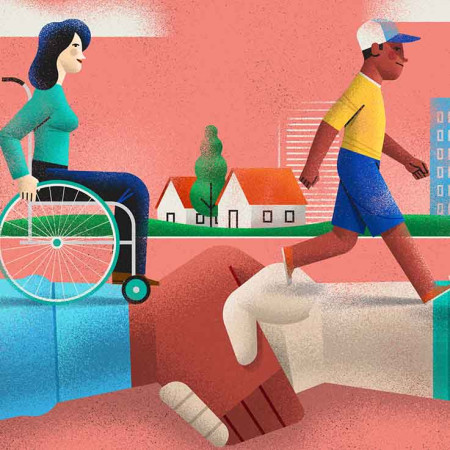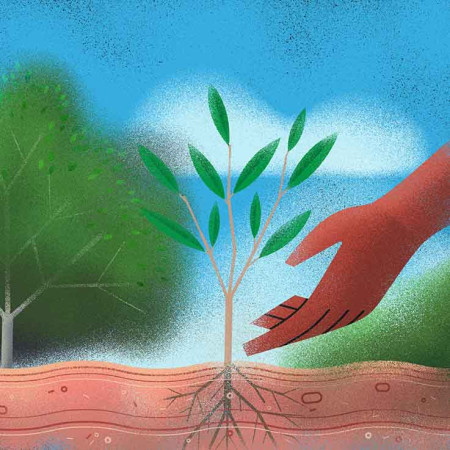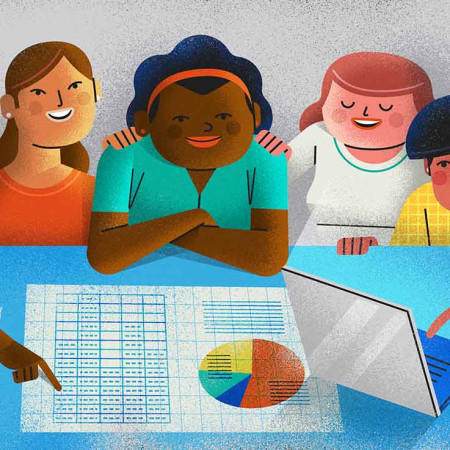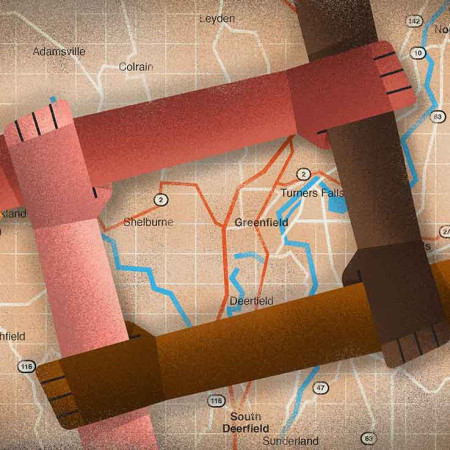-
sponsored
A Learning Agenda for Collective Impact
Collective impact initiatives have contributed to systems changes and improved the lives of many living in our communities. In the next decade, they must focus on equity, shifting imbalances of power, sustainability, and greater collaboration across initiatives to achieve even more lasting social change.
-
sponsored
The Leading Edge of Collective Impact: Designing a Just and Fair Nation for All
Corporate, government, and civil society leaders can use the collective impact approach to address structural racism, restore communities, and design a multiracial democracy.
-
sponsored
Working in Partnership With Opportunity Youth
Leaders of the Aspen Institute Forum for Community Solutions’ Opportunity Youth Forum share lessons from a decade of work achieving better outcomes for young people.
-
sponsored
The Relational Work of Systems Change
Collective impact efforts must prioritize working together in more relational ways to find systemic solutions to social problems.
-
sponsored
Embracing Collective Impact at United Way
Four leaders of United Ways across the United States discuss shifting their roles from funders to true partners in collective impact efforts.
-
sponsored
How Funders of Collective Impact Initiatives Can Build Trust
Four ways funders of collective impact efforts can help foster trust to strengthen collaboration and achieve greater impact.
-
sponsored
How Field Catalysts Accelerate Collective Impact
A look at how the Tamarack Institute united the efforts of local collective impact initiatives across Canada to accelerate systems change in support of a living wage.
-
sponsored
Power and Collective Impact in Australia
How Australia’s history and culture influence collective impact initiatives and create momentum for collaborative work that is more equitable and inclusive.
-
sponsored
Data in Collective Impact: Focusing on What Matters
Understanding data and using it effectively in collective impact can help achieve short- and long-term progress on shared goals.
-
sponsored
Using Data to Disrupt Systemic Inequity
A look at how the collective impact initiative StriveTogether is enlisting data to resolve systemic barriers that limit opportunity for children and families of color in the United States.
-
sponsored
Centering Racial Justice and Grassroots Ownership in Collective Impact
How a top-down coalition focused on reducing youth substance use in a predominantly white, rural area of Western Massachusetts has prioritized equity and community engagement.
-
sponsored
10 Dangers to Collective Impact
A look at the worst practices in using the collective impact approach for social change and lessons on how to avoid them.
-
sponsored
Reflecting on Collective Impact for Place-Based Social Change
Four nonprofit leaders discuss their experiences using collective impact for collaborative, place-based change, including their views on the role of data and philanthropy, and what lies ahead for this field of work.
-
sponsored
Interview: Bringing an Anti-Racist Approach to Collective Impact
Two collective impact leaders, Zea Malawa of Expecting Justice, and Miya Cain of FSG, discuss using the framework to achieve social change and how to put anti-racism at the center of cross-sector collaborations.
-
MAGAZINE FEATURE
Collaboration
Centering Equity in Collective Impact
A decade of applying the collective impact approach to address social problems has taught us that equity is central to the work.

sponsored
Collective Impact, 10 Years Later
The year 2021 marks 10 years since the publication of the article “Collective Impact” in Stanford Social Innovation Review. Over the last decade, organizations working around the globe have applied the practice of collective impact to solving a broad range of social and environmental challenges, and the approach has been incorporated into the structure of national and local public programs in the United States and abroad.
We can attribute much of the growth, success, and sustained interest in collective impact to the learning and sharing of practitioners, funders, and many partners who have cultivated and worked to adapt the practice over time. Their experiences and feedback, as well as decades of collaborative work predating 2011, have contributed to the evolution of the approach, particularly around themes of equity, community ownership, power, data, and sustainability.
This series, sponsored by the Collective Impact Forum, a program of FSG and the Aspen Institute Forum for Community Solutions, will reflect on this evolution through articles, case studies, practitioner interviews, and roundtable conversations that highlight the range of ways this approach has taken root—and importantly, the impact it has had on improving outcomes for marginalized and oppressed communities. It will also present an adapted collective impact framework that centers equity and look ahead to how those working in social change can continue to support and strengthen collective impact work.
Ultimately, this series is a call to action for practitioners, funders, and social change leaders to design and implement cross-sector collaborations that focus on equity, community engagement, and power sharing in order to contribute to positive results and justice in their work. Indeed, during these times of ongoing crisis and intense polarization, it is critical that we work together to protect the most vulnerable in our communities, especially those most impacted by systemic racism, inequity, and poverty.
The Collective Impact Forum would like to thank the California Health Care Foundation for their direct support for this project. This project was also made possible in part by general support from The William and Flora Hewlett Foundation.
(Series illustrations by Hugo Herrera)
















